Dolphins have captivated humans for centuries with their playful demeanor and intriguing behavior. In this article, we delve into the depths of dolphin intelligence, exploring the latest research findings that shed light on just how smart these majestic creatures truly are.
A Summary of Dolphin Intelligence
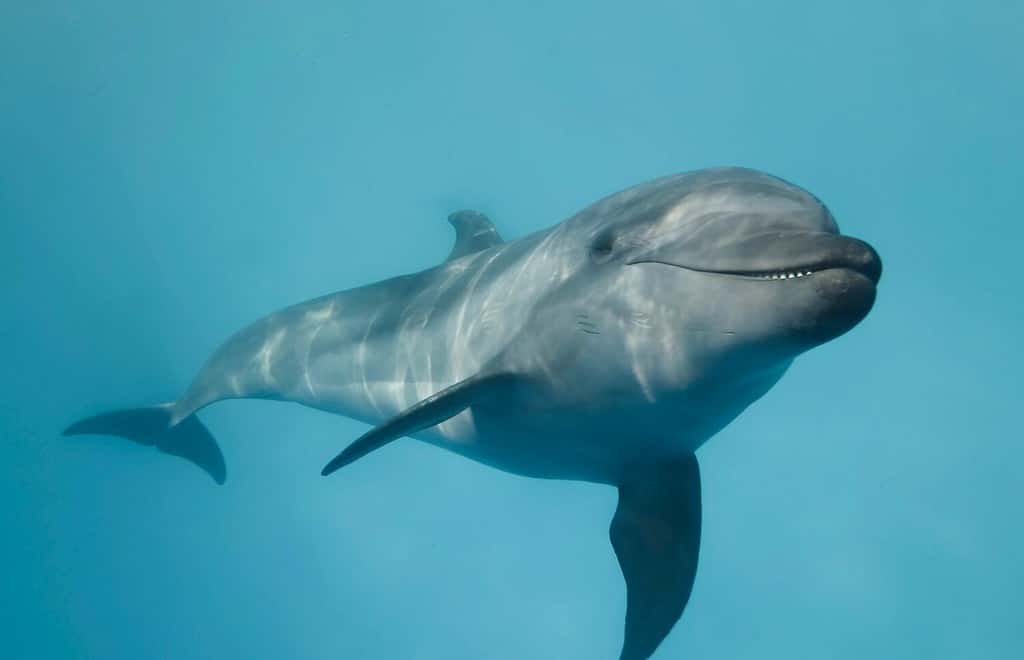
Dolphins have amazing communication skills and name their children just like humans do.
©Andriy Nekrasov/Shutterstock.com
The brains of dolphins are quite large in comparison to their body size and are second only to humans. This is typical of other long-living, social creatures. Dolphins tend to devote a great deal of attention to their offspring, with females typically having a few young and teaching them essential life skills. The young dolphins take a significant amount of time to reach maturity and independence.
The brains of dolphins differ from ours in that they possess an entire area devoted to echolocation, which allows them to “see” utilizing sonar. This ability is extremely advantageous for dolphins since sound travels much better through water than light. Subsequently, they can navigate in dark or murky water and use echolocation to hunt. Additionally, dolphins can detect the pregnancies of other dolphins and use the echolocating clicks of other dolphins to identify what they are looking at.
The brains of whales and dolphins contain spindle neurons, which are related to capabilities like recall, logical thinking, talking, sensing, adjusting to change, problem-solving, and comprehension. This implies that dolphins are very intelligent. Moreover, their limbic system, which is responsible for emotions, is more intricate than a human’s. People who have worked with dolphins a lot say that a solitary dolphin isn’t really a dolphin. Being a dolphin means being entwined in a complicated social network…even more than with human beings.
Cognitive Capabilities: Understanding a Dolphin’s Problem-Solving Skills and Learning Aptitude
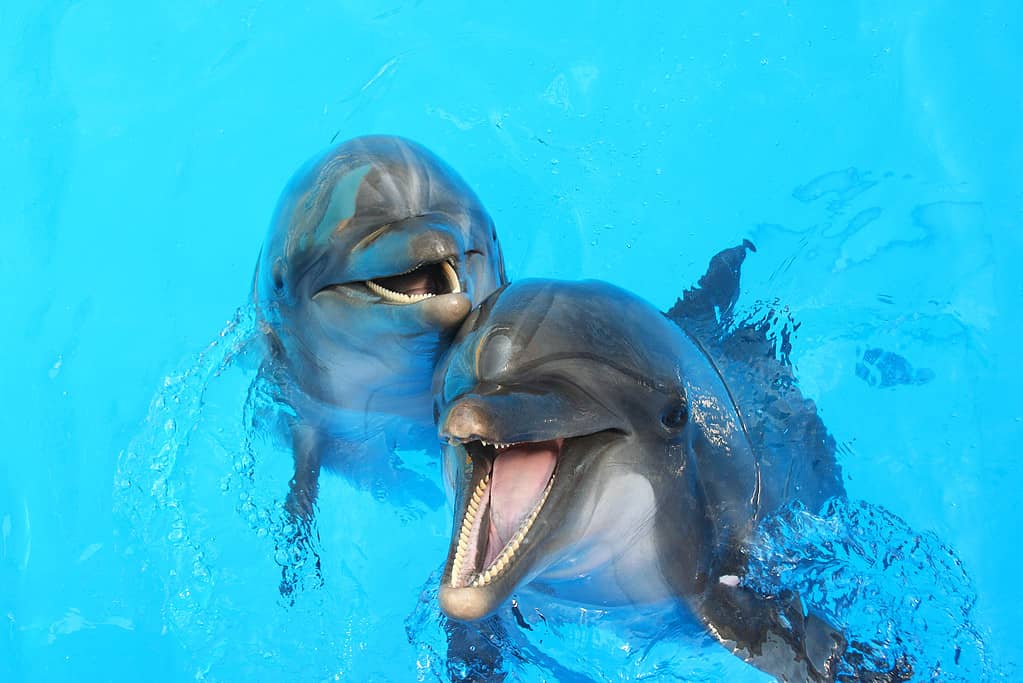
Dolphins recognize themselves in mirrors and have a complex language.
©Elena Larina/Shutterstock.com
It is no secret that dolphins are incredibly intelligent creatures. Studies have shown that their cognitive abilities surpass those of primates, dogs, cats, and even some birds. Dolphins have complex problem-solving skills and a remarkable learning aptitude. They can remember objects and people for long periods of time, as well as recognize themselves in mirrors—which demonstrates a level of self-awareness seen only in a few species.
Dolphins also display impressive cooperative behavior with one another when hunting for food, and people have observed them using tools in the wild. For example, dolphins will sometimes hold sponges over their beaks when foraging on coral reefs so that they can protect themselves from sharp edges and other hazards. They also use cooperative strategies to herd fish into shallow waters, making it easier for them to catch their prey.
Dolphins have advanced language skills as well. They can learn to imitate human speech and understand simple commands in their own language. Their speech is a series of clicks, whistles, and other noises. Studies also suggest that dolphins are able to recognize individual calls from other members of the same species—something that is truly remarkable.
Dolphins are also very playful, which is a major sign of intelligence. It is clear that dolphins demonstrate a great amount of intelligence through play. They perform acrobatic feats while riding the bow wave of boats and playing with plants or shells. They even have a game of catch by throwing a fish or turtle. Dolphins also engage in tag-like games with each other and team up with humpback whales for mutual enjoyment. All of this is evidence that dolphins are highly intelligent creatures with a great capacity for problem-solving and learning.
Social Interaction: How Dolphins Communicate with One Another
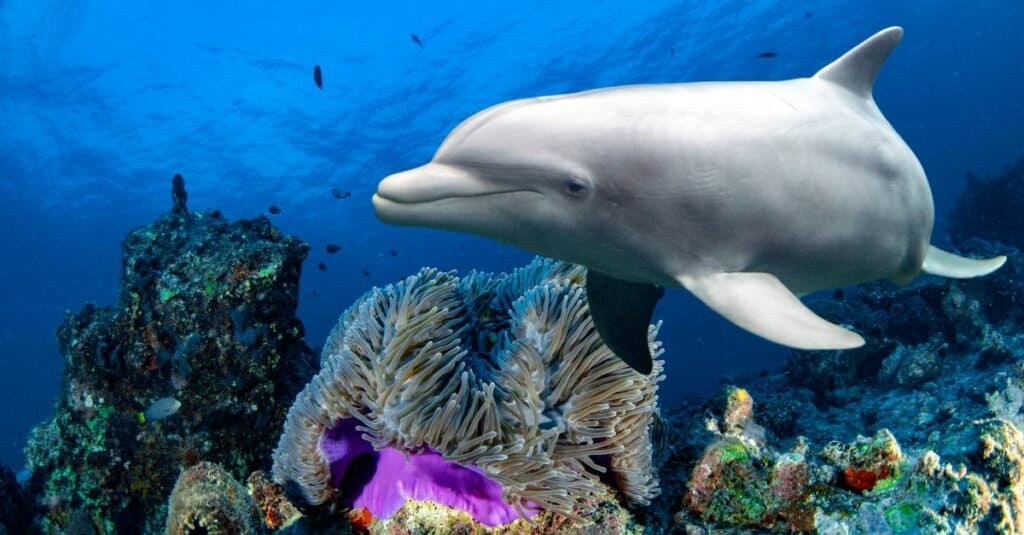
These caring creatures take care of elderly dolphins or sick or injured family members.
©Andrea Izzotti/Shutterstock.com
Dolphins possess an advanced ability to communicate with one another. They use a variety of vocalizations, body language, and even touch to convey their thoughts and feelings. One example is the signature whistle that dolphins produce. Each individual dolphin has its own unique whistle, which it uses as a form of identification when interacting with others in its pod. Dolphins also engage in play behavior, such as chasing one another and playing tag or hide-and-seek.
Experts have discovered that certain dolphin species utilize exclusive names to recognize and contact each other. Baby dolphins learn their names (special whistles) from their moms and preserve them for their lifetime. Dolphins meet one another while swimming by trading their names. Amazingly, it appears that they recall the names of other dolphins for many years! Apart from humans, no other creature uses particular given names for each other.
Furthermore, dolphins use cooperative behavior when working together to hunt, navigate obstacles, or care for the young. They are also capable of understanding and responding to human commands. Dolphins use whistles, body language, facial expressions, and other forms of communication. Dolphins can coordinate their actions with each other even without direct physical contact.
Finally, dolphins talk to one another by producing unique combinations of clicks and whistles. These sounds are specific to a particular individual or group. This is an impressive feat as it implies that dolphins have their own unique language that they use to communicate with one another. This is further evidence of the intelligence and social complexity of these animals. It suggests that dolphins can understand each other’s intentions and emotions through communication.
Intelligence in the Animal Kingdom: Comparing Dolphins to Other Species
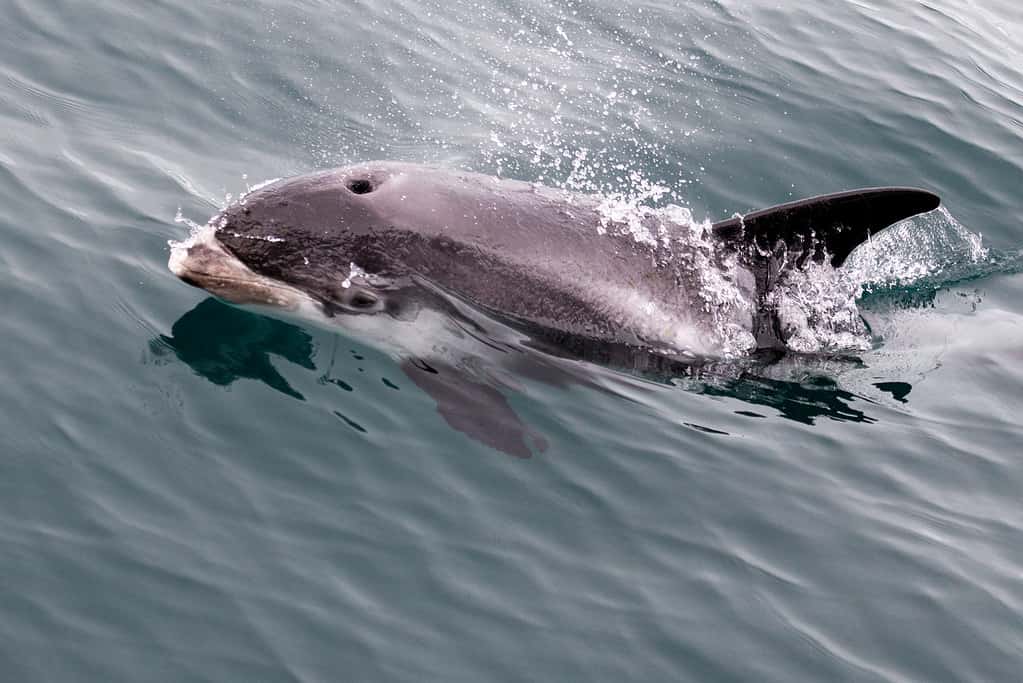
There are more than 40 different types of dolphins.
©Maria 81/Shutterstock.com
When comparing the intelligence of dolphins to other species, it is difficult to offer an objective assessment due to the lack of research on wild dolphins and their behavior. However, we can look at what we do know about dolphin cognition and communication skills. They stand out as being one of the most intelligent animals in the world.
In comparison with other mammals, such as chimpanzees or elephants, dolphins have similarly advanced cognitive abilities. All of these creatures exhibit complex social behaviors, including cooperative hunting strategies and tool use.
Octopi are often seen as being the most intelligent of all marine animals. Some research shows that they can learn and remember complex tasks. They use tools in order to hunt prey and can even recognize themselves in a mirror. Whales also display advanced cognitive abilities, such as an ability to understand abstract concepts and solve problems.
Sharks have long been thought of as relatively unintelligent animals due to their limited social behaviors. However, recent studies suggest that they may have a greater capacity for learning and problem-solving than previously thought. All things considered, dolphins are still one of the most intelligent animals in the ocean.
Past Discoveries and Studies on a Dolphins’s Intelligence
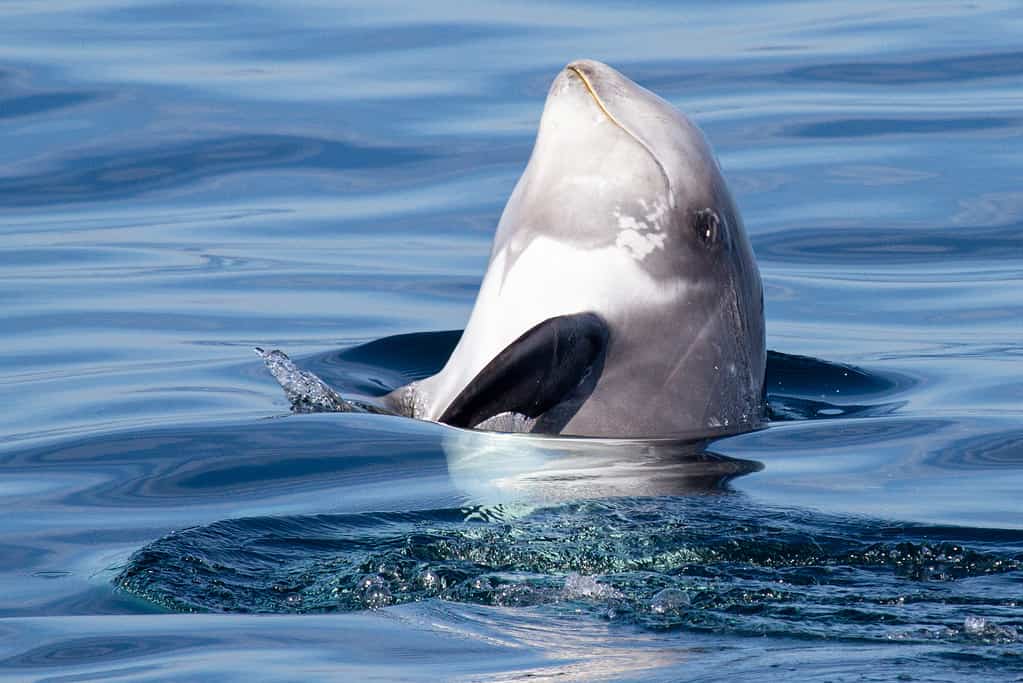
Dolphins like to relax and play games just like people do.
©Tory Kallman/Shutterstock.com
Since the 1960s, scientists have been exploring the cognitive abilities of dolphins. Early studies focused on their communication capabilities and social behaviors. In 1969, researchers first noticed that a dolphin could imitate sounds produced by humans. This was seen as a breakthrough in understanding how dolphins communicate with one another, and it showed that dolphins had an advanced ability to understand complex concepts.
In 1971, researchers conducted experiments that tested a dolphin’s ability to solve puzzles presented to them in order to receive food rewards. This study showed that dolphins had the capacity to learn and problem-solve, though not as quickly or efficiently as other animals, such as chimpanzees. Subsequent studies revealed more about dolphin intelligence, including their ability to recognize themselves in mirrors and recall past experiences.
In 2006, researchers conducted a study that tested the cognitive abilities of a bottlenose dolphin named Kelly. In this experiment, she was trained to respond to various commands and solve basic puzzles. The results of this test showed that dolphins have a high level of intelligence. They can learn complex tasks quickly, much like other animals. Additionally, researchers found that dolphins are able to remember the commands they were taught for long periods of time after being trained.
The results from these studies further reinforced the idea that dolphins are highly intelligent creatures with several advanced capabilities. Though more research is needed to fully understand their intelligence, it is clear that dolphins possess many of the same abilities as humans in terms of problem-solving and learning.
Thank you for reading! Have some feedback for us? Contact the AZ Animals editorial team.








